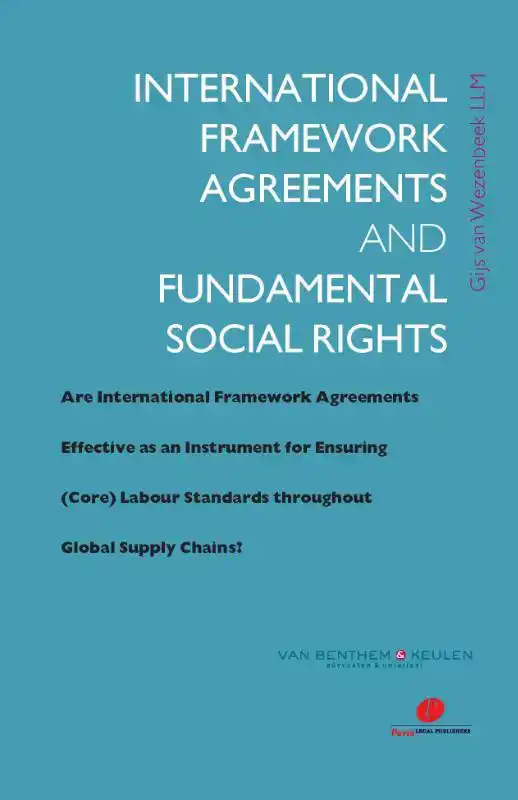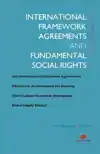- Boeken
- Informatief
- Gamma
- recht algemeen
- arebeids soc zekerh.
- INTERNATIONAL FRAMEWORK AGREEMENTS AND FUNDAMENTAL SOCIAL RI
WEZENBEEK, G. VAN
INTERNATIONAL FRAMEWORK AGREEMENTS AND FUNDAMENTAL SOCIAL RI
35,50incl BTW
Vertrouwd sinds 1927
Persoonlijke aandacht en advies
Vanaf 17,50 gratis verzenden NL & BE
Meer dan 150.000 artikelen online
Omschrijving INTERNATIONAL FRAMEWORK AGREEMENTS AND FUNDAMENTAL SOCIAL RI
In an era of economic globalisation, the declining regulatory role of governments competing for investment and the rising power of multinational enterprises are leading to a race to the bottom in the area of fundamental social rights. This issue need
s to be redressed. It is essential to promote fundamental social rights, at both national and international level, in order to give economic globalisation a more human face. At present, the advancement of social rights is mainly in the hands of the I
nternational Labour Organisation, the Organisation for Economic Cooperation and Development and the United Nations, which provide minimum labour standards that focus on governments and enterprises. Due to a lack of political will to develop legally b
inding agreements that directly address multinational enterprises, the implementation and recognition of fundamental social principles and standards throughout global supply chains are based mainly on soft law.
In practice, social rights are
largely in the hands of multinational enterprises. A relatively new instrument that enables global union federations to encourage transnational companies to respect labour standards, wherever they operate, is the conclusion of International Framewor
k Agreements (IFAs). IFAs are agreements between a global union federation and a multinational enterprise on fundamental social rights throughout the company''s supply chain. At present, more than 60 such agreements have been concluded, covering more
than 6 million workers worldwide.
This study examines the effectiveness of IFAs as an instrument for ensuring labour standards throughout global supply chains by analysing the addressees, content, follow-up and binding effect of these agree
ments and makes recommendations to improve their effectiveness.
This study will be of great value to academics and (international) labour and employment law professionals. It will also be of particular interest to the international trade uni
on movement, multinational enterprises, employers and workers worldwide.
s to be redressed. It is essential to promote fundamental social rights, at both national and international level, in order to give economic globalisation a more human face. At present, the advancement of social rights is mainly in the hands of the I
nternational Labour Organisation, the Organisation for Economic Cooperation and Development and the United Nations, which provide minimum labour standards that focus on governments and enterprises. Due to a lack of political will to develop legally b
inding agreements that directly address multinational enterprises, the implementation and recognition of fundamental social principles and standards throughout global supply chains are based mainly on soft law.
In practice, social rights are
largely in the hands of multinational enterprises. A relatively new instrument that enables global union federations to encourage transnational companies to respect labour standards, wherever they operate, is the conclusion of International Framewor
k Agreements (IFAs). IFAs are agreements between a global union federation and a multinational enterprise on fundamental social rights throughout the company''s supply chain. At present, more than 60 such agreements have been concluded, covering more
than 6 million workers worldwide.
This study examines the effectiveness of IFAs as an instrument for ensuring labour standards throughout global supply chains by analysing the addressees, content, follow-up and binding effect of these agree
ments and makes recommendations to improve their effectiveness.
This study will be of great value to academics and (international) labour and employment law professionals. It will also be of particular interest to the international trade uni
on movement, multinational enterprises, employers and workers worldwide.
Specificaties
- MerkONBEKEND \ MERKLOOS
- GroepRECHT ALGEMEEN (820)
- Barcode9789077320778
- LeverstatusActief
Reviews
0.0/5.0
Gemiddelde uit 0 reviews
Meest behulpzame reviews
Nog geen reviews geschreven


